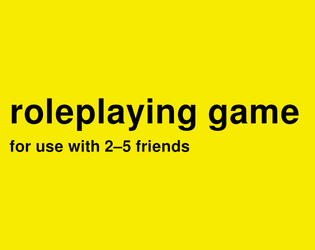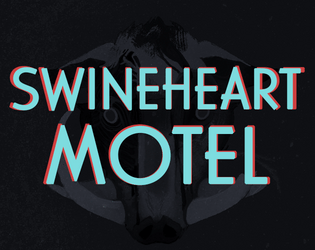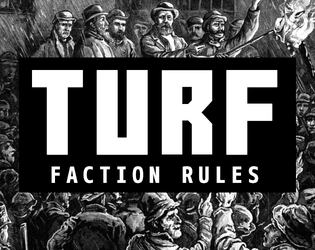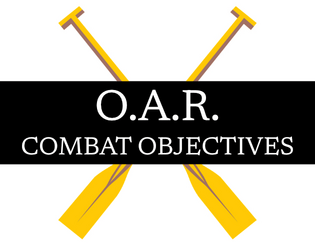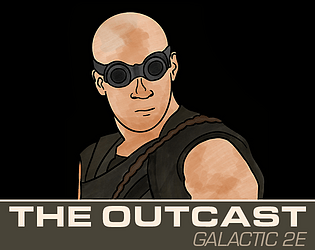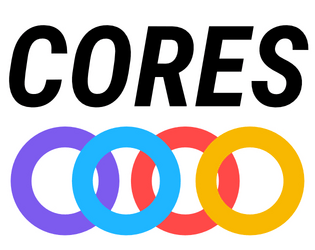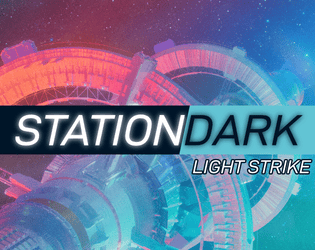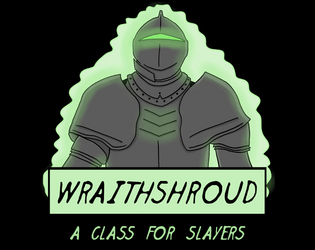Wow I love this! Great job.
mindstorm
Creator of
Recent community posts
Nice, I really like those pair ups of the cores to the attributes. I've never tried tying them specifically like that, so I'm interested to see how it turns out. I'm very invested in your hack already, heh, since I love OpenD6 so much and think that the system still (mostly) holds up to this day.
I haven't seen the variant with only a single d6 roll, but that seems like a good way to even out the massive discrepancies between someone rolling 1D vs 5D! And having a set number of action dice that you can use to boost it, but those also double as your action economy? This is good stuff!
Please share the pdf with me when it's at a stage your comfortable with, and good luck!
Grandpa's Farm is such a great solo game and it blew me away when I read it. I'm approaching it as a slow burn, playing the mechanics for a season out one day and then daydreaming about the results for a few days, until I write my letter.
Getting to spend time with my thoughts and the results really encourages me to savor the game and come up with unique twists and turns that I couldn't get anywhere else. Thanks brain!
The extra rules for festivals are great, and playing with other people is a delight too. I had a friend "spend a season" with me and we worked on the farm together, before they went off to start their own fixer-upper.
This game is such a great solo game that hinges on the creative aspect of letter writing, and I can't wait to start again on an orbital solar farm for my next playthrough!
Alright, let's open this up and have a look. Right away, we're getting a really strong premise here. This is the first in a series of one-shots that can link together into a an epic, larger narrative. This has some serious cinematic universe energy already, and that's what we're here for, so heck yeah.
The text immediately calls out future releases to string together a connected universe, and that's dope. And the payoff of playing all those games and then getting to play in a superhero team-up game? Yes. This is the exact premise I've thought about every time I've played or ran a superhero game. This game is setting out to finally pull it off. I'm in.
We get some instructions about the game right away and then some flavor text to draw us in. It works well because it's short and sweet and not a long and drawn out exposition piece.
Safety tools are up next—good to see them at the forefront here—and then we go into the How to Play and mechanics section. The play section is short but informative, written in a way that anyone can pick this game up and play with their friends. It's designed as a one-shot, so this tracks; it shouldn't be hours of reading or filled to the brim with rules.
Speaking of rules: the basic mechanics are rolling 3 six-sided dice and trying to meet or beat 12. Yep, this is good. I've always been a fan of D6 systems, and this looks like it's stripped down to what needs to work and then gets out of the way.
A setting primer directly follows the rules: a series of questions that you answer as a group to flesh out the world. These are not little ad-lib questions that make a small change in a predefined world. These things shake it up. We get a direct call out to setting the game in the 20th century too, so ya'know, doesn't have to be horses and swords (but that's there too.)
The game lays out some story beats, including some prologue setup, that can help kick off the game. The setting of the game is wide open, but there's a bit more definition in terms of what the story we're trying to tell is. The big bad has some kind of powerful artefact, and the First Knight needs to get it back before world ending stuff happens. That's the bones of the idea, but there's lots of implied and suggested twists to make it your own.
One of the big problems with one-shots is that it's hard to pace them, and the First Knight acknowledges this problem and provides some tools to help alleviate it. There's a light and easy mechanical engine with clocks built in, so as the MC you can always sort of grasp where the story is, and what sorts of things could conceivably happen next.
The MCing section is familiar to anyone who's played a PBtA game before, but it's trimmed down and also mixed a bit with positioning from Blades in the Dark. This is a good move and thinking about position—especially in the superhero genre—should definitely be on the forefront of an MCs mind. Like PbtA, MCs don't roll dice, but make moves based on the PCs.
Alright, playbooks. The meat. These are nice and easy to read and understand, which is a must for one-shots. The playbooks have roles (like Super Soldier), and those roles have tags (like Superhuman Strength). When you apply a role, you get a bonus. When you apply a tag, same deal. (Edit: fixed for clarification I recieved from comment below.)
Each playbook also has special moves. When I say moves, these aren't complex multi-step moves with tiers of success, these are straight up things you can do. They've got a trigger and a result. Another point in the favor of The First Knight, the moves are perfect for the playbooks but not so complex that the game bogs down in the minutiae.
Other than The First Knight, you've got The Lancer (a friend/rival), The Agent (a spy), The Arcane Scholar (scientist-type), and The Bard (a hype-up character.)
Apart from The First Knight, the other classes can (and in some ways, are expected to) perish during the game. This is an origin story, so that's on par. They've got special abilities that trigger if they do go down during the game, and that lends weight to the cinematic feel of the game.
If I had to voice one critique, it's that while the Bard playbook is great, it'd be one or two steps harder than the rest to get it into a more modern setting. Not impossible, mind you. Just an extra step or two.
The book is well put together and surgically designed for one-shot play. This is a popcorn night game where everyone at the table is going to be buying into the tropes and having a great time. This game could be the start of your own cinematic universe. And that's really cool!
And that's The First Knight. The game that sets out to be a superhero origin story, and it ABSOLUTELY DELIVERS. I want to play this game. I want to play the next game in the series. And then the next game. And then I want to get together with all my friends and play the SUPERHERO TEAM UP GAME.
This is a fun little journaling game where—surprise—you write a story as a pangolin pianist. There's five prompts for you to follow along your career, and each prompt asks a question and provides a table to choose (or randomly roll!) in a way to spark your imagination.
I'll say this: we need more pangolin games. That much is clear. And this is a wonderful little game that can be both solemn and hilarious at the same time. I mean, you're a pangolin. Playing music.
If you're looking to read someone's journal, you can find mine right here!
Alright, putting on Phanta by Le Tigre as I read through this. Seems necessary!
First off we get a short explanation of the setting of the game, what you need to play, and what kind of characters you'll be making. One of the hooks that grabbed me right away was the name of the group you'll be part of as a character: The Children of the Flowers. I like this immediate sort of contrast to the post-apocalyptic tone!
After that we get to the meat of the mechanics of the game: it's 2d6 added together to land on a band of results (from failure with major consequences to success with a boon.) One thing that immediately caught my eye as something I LOVE is that certain results actually give you a choice: with 6-8 you can choose "Success with a Minor Consequence, or Failure." Putting that choice in is a really good move—sometimes, I don't want the often lauded "success with a cost" result. Giving a choice between that and failure is just... more fun.
"Success with a boon" isn't just a critical success on the check, it's spelled out that it is a semi-permanent boost that a character receives, that will help them in some way down the line. I really enjoy this distinction since it makes those rolls where you get a 12 feel much more impactful and rooted in the world.
I'm a pretty big fan of skills in RPGs, so it's nice to see them here. There's a list of 10 and they're pretty representative to what kinds of things I imagine characters doing in a post-apocalyptic setting. No bonuses to the roll, instead we're just rolling 3d6 and taking the highest 2.
Minor Injuries are tied to skills which I really love! Combat itself seems like a quick and loose affair, leaving a lot of room for narrative positioning and cinematic moments.
Building a survivor seems pretty quick—choose one of the 5 playbooks and start filling it out. There's a levelling system here, which I also enjoy. During character creation, you're also tying your character to at least 1 other person living in Eldorado Springs, which is great. Knowing the group I regularly play with, this part of the game would probably result in us creating 10-15 NPCs with complex relationships, which I think works awesome for this.
The playbooks are downloadable for everyone on itch. Each one is specialized for a different task, and they all have specific advances for levelling up. Players creating their own advances seems like such an easy and fun thing to do I was really glad to see that called out directly in the book. I enjoy the approach to characters in this game; they're not powerhouses of a million different moves and abilities to learn, but they don't feel restricted or locked down like structured "Moves."
Along with much appreciated safety tools, that's the mechanics, and now we're moving on to the lore of the world!
The background of Phanta is precise and evocative, and the characters belonging to a hippie-founded (prophetically-correct) doomsday cult is a fresh change in the milieu! The set-up gives us several solid and interesting hooks for starting a game, and a second faction nearby that has settled into a long-standing truce. (Immediately, I imagine the delightful potential to tie some of The Children to The Residents for story-hooks and roleplay.) My only critique here is the desire to see more named NPCs like Faith Leilani presented with their own story hooks, but the NPC creation that's part of building a character helps alleviate that.
We get to the section of the game for the GM, and are immediately presented with a good list of example names to come up with more NPCs from both factions. The advice for running the game is great and applicable for anyone, especially the parts about collaborative worldbuilding. We then get an example list of enemy stats which are simple and easy to create on the fly (one of my highest prized things I look for in an RPG) and then an absolutely awesome list of boons to offer the players on a roll of 12. These are permanent additions to a character that make them stand out! Equipment is likewise simple and easy to make, and there's an undercurrent implied here that you should mess around and just try making some stuff on your own and not worry to hard about breaking the system. I dig it.
Overall, I think Phanta is a great game with a very solid mechanical base that encourages hacking and modification. The world is fun and interesting with some great twists that set this apart from just another mad-max like post-apocalyptic game (though it could easily handle that, too.)
This first thing we get to when we're reading this Slayers expansion is some really exciting new lore that helps flesh out the existence of the districts in the core book. The ideas here are really good and they don't break the implied setting or make it incompatible. Rather, the Void enhances the setting; and offering some permanence to the core districts allows you to easily adapt these new chunks to the setting.
We get an entirely new district, The Citadel, and the supplement puts this at the heart of the City. It's a great district and fits in well with the other districts of Slayers. The details provided for this new place to explore are evocative and full of adventure seeds—always nice to see!
Next we have the set-up for the campaign itself, and this is detailed well and easy to grasp. The series of missions can be connected in whatever ways the GM sees fit, with events being triggered as time passes to string everything together.
Now we get to the actual "session" break-downs, which are solid frameworks that you can apply like a template to various hunts. For the most part you need to provide the hunts themselves, but these are pretty easy to come up with for Slayers. In addition, there's some advice about using the hunts in the core book, which is a great start. These frameworks are an excellent way to help weave an underlying story through the "monster-of-the-week" style hunts that works well with Slayers. If your campaign is a tv series, the framework in Clockwork Void is the overarching plot that connects everything. (With an awesome season finale provided!)
Lastly, we get some quick rules to help expand the city and track it, and also a way for the void to consume the city.
Overall, this is a great expansion to Slayers that can help you create a larger plot between your session hunts. The way it is presented is easily digestible. The only critique I would give is that there are some reoccurring things that are designed to show up between various frameworks and I think if the supplement provided a little cheat sheet or scorecard you could fill out as you play, that would save me the 20 seconds of doing it myself. So not a major thing at all, mostly just an "I'm lazy" thing.
If you like Slayers but think that the "random" hunts are just a bit too random, you should really grab The Clockwork Void. If you want to create your own overarching plotline, you could use this supplement as a template for your own ideas. There's even ways you can *reuse* the framework over and over again.
I really hope we see more from Rhombencephalon because this is really good stuff!
If you're here, I assume that you and I share a very similar hobby: Reading RPGs! Probably more than we could ever play in our lifetimes! Which is great; there's a lot of fantastic games out there and it's really energizing to see what creators are doing for the hobby.
This little meta-rpg is a way to gamify something you're probably going to do already. Read RPGs. Leave ratings. Write reviews. Level up. Repeat. I think it's fun, and I think everyone should be doing what they can to leave ratings and reviews for others. Now, you can do that and protect your own magical library.
I think it's such a cool idea I made a google spreadsheet you can use as a character sheet / logbook. Grab it here by making a copy into your own google drive. It even automates stuff for you, to get things out of the way so you can get back to reading RPGs and reviewing them!



